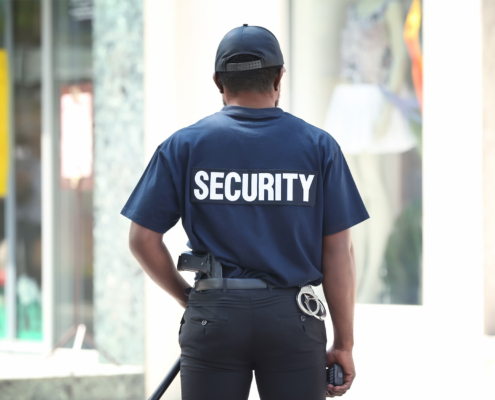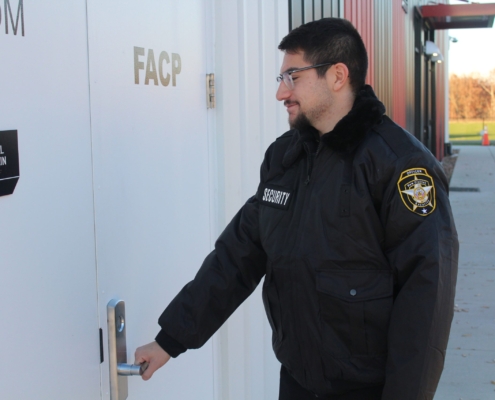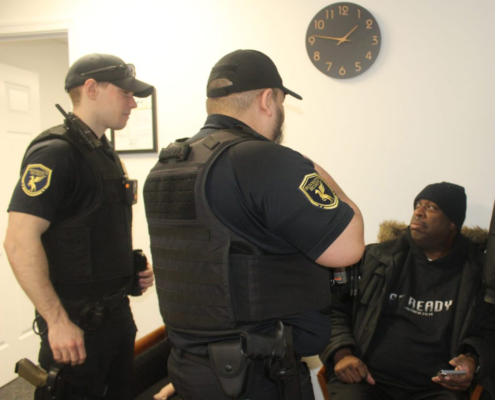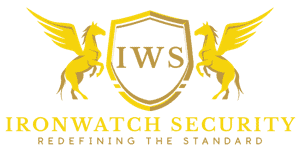How to Choose the Right Armed Security Services for Your Business
Even the best alarm system can’t talk down an angry customer or stop a smash-and-grab in progress. When the stakes get high, you need armed professionals who know exactly what to do.
Even the best alarm system can’t talk down an angry customer or stop a smash-and-grab in progress. When the stakes get high, you need armed professionals who know exactly what to do.
Unfortunately not every company that flashes a badge is worth your payroll dollars. Before you sign a contract, here’s how to separate the pros from the pretenders:
A few things are non-negotiables when it comes to your commercial security needs. Here are the must-haves:
Every armed security company must hold the right license for your jurisdiction. In Virginia, that’s the DCJS 075 endorsement; in D.C., it’s the Metropolitan Police Department’s Special Police licensing. Ask for license numbers, then verify them on the issuing agency’s public database. If the company hesitates, consider it strike one.
Industry baseline is $1 million per occurrence for liability and workers’ comp, but high-risk sites (banks, jewelry stores, cannabis dispensaries) often require $5 million. Request certificates directly from the carrier, not the security firm. An “in-force” letter shows the policy hasn’t lapsed.
Annual criminal checks and random drug tests keep questionable hires off your property. Demand to see the screening policy in writing. Evaluate criteria like frequency, disqualifying offenses, and the lab that handles tests.
Brochures often list “[X] hours of firearms training,” but numbers alone don’t tell you whether guards can shoot straight under pressure. Probe for specifics:
Ask to sit in on a class or observe a range day. Reputable firms are proud to show their curriculum.
Paper credentials are one thing, but demonstrated performance carries more weight. Instead of bullet-point résumés, try this quick litmus test:
Tell me about the last challenging incident your team handled that’s similar to my environment.
A solid company can recount specifics: date, threat type, actions taken, and outcome. You’ll also want to know how long guards stick around. An average tenure of 18 months or more suggests decent pay and strong leadership. These two factors translate directly to steadier coverage on your site.
Even the best-trained guard isn’t helpful if coverage starts late or incident reports trickle in days after a problem. Ask armed security service providers to show, not tell, how they handle time-sensitive issues.
If a provider can demonstrate all four points, you’re looking at a team that takes urgency as seriously as you do.
Solve your commercial security needs with IronWatch. Visit our page on security for businesses to see how professional coverage should look.
Sticker shock pushes some owners toward the lowest bid, but security isn’t a commodity; you’re paying for people, preparation, and peace of mind. Before you sign the “cheapest” contract, check for the hidden costs that often come with bargain-basement quotes:
A fair price reflects a livable wage for guards, ongoing training, supervision, and adequate insurance. Compare proposals line by line rather than headline to headline.
Below is a condensed “final round” tool you can copy straight into your vetting spreadsheet. Reference this list before you hire a security provider:
| Category | Requirement | Pass / Fail |
| Licensing | DCJS 075 (VA) or MPD SPO (D.C.) number verified | |
| Insurance | $1M+ general liability, $3–5M for high-risk sites | |
| Guard Screening | Annual background checks & random drug tests | |
| Training | Documented live-fire & scenario drills | |
| De-Escalation | Certified MOAB/CPI credentials | |
| Digital Reporting | Real-time, photo-backed incident logs | |
| Client References | Industry-specific, positive reviews |
If any critical box stays unchecked, keep shopping for an armed security service provider.
Even the slickest proposal can hide warning signs. Give each of these red flags its own hard look before you sign:
If you ask about training hours, de-escalation courses, or firearms recertification dates and get blanket statements like “we’ve got that covered,” pause the conversation. Credible providers know their numbers down to the course codes and renewal timelines and are proud to share them. Evasive replies often mean bare-minimum compliance or, worse, no real program at all.
Standard-operating procedures (SOPs), use-of-force rules, and insurance certificates protect both parties. A firm that stalls or hides behind “proprietary” language may be cutting corners. Professional agencies hand over redacted copies quickly because they’ve already invested in thorough documentation and have nothing to conceal.
Staffing an armed post with screened, drug-tested, and range-qualified officers takes time. When a vendor guarantees a full complement of guards within 24–48 hours, ask how they’ll accomplish that without rushing background checks or pulling strangers off a temp list. Speed promises often translate into hurried vetting and higher turnover once the contract begins.
Browse the Better Business Bureau, local court dockets, and industry forums. A string of unresolved complaints, lawsuits, or news articles about misconduct usually indicates systemic issues such as poor supervision, lax hiring, or sloppy training. One bad review isn’t a deal-breaker; a pattern of them should send you straight back to your shortlist.
Security is a risk-management partnership, not a one-call close. If the salesperson pressures you to sign on the spot, discounts only “today,” or glosses over your questions, imagine how responsive your armed security services will be when an actual incident occurs. Trustworthy providers educate first, quote second, and let you take the time you need to decide.
Trust your gut: a defensive or evasive vendor today can quickly become tomorrow’s compliance nightmare.
How do you measure guard performance month to month?
Look for objective audits such as mystery posts, KPI dashboards, disciplinary thresholds.
What’s the most recent incident your team mishandled, and how did you fix it?
Honest answers show accountability; perfection claims are red flags.
How many supervisors oversee each shift?
A ratio above 1:10 usually means stretched oversight.
Can I attend a quarterly refresher or ride along for an hour?
Access demonstrates transparency and confidence in day-to-day operations.
What’s your average guard tenure?
Anything under a year hints at poor morale or sub-par pay.
Document their responses. The firm that answers thoroughly, and follows up in writing, typically delivers that same clarity once on contract.
Avoid these missteps and you’ll start the partnership on solid ground.
Choosing an armed security provider is about verifiable credentials, transparent processes, and proven results. If you’re shopping for armed security services, follow the roadmap above. Confirm licensing, dig into training depth, check real-world performance, and insist on crystal-clear communication.
By the time you tick every box, you’ll have filtered out the pretenders and uncovered the partner who can truly safeguard your people, assets, and brand.
Need a head start on the vetting process? IronWatch Security is happy to walk you through its certifications, training regimen, and live reporting tools—no obligation, just straight answers. Reach out today to schedule a discovery call and see how a properly credentialed team can cut risk, boost compliance, and let you focus on running your business.
 https://www.ironwatchsecurity.com/wp-content/uploads/2025/12/How-HOAs-Can-Improve-Safety-and-Retention-With-Residential-Security-1.jpg
1250
2000
Abstrakt Marketing
/wp-content/uploads/2025/01/fulllogo_transparent-color.png
Abstrakt Marketing2025-12-09 14:16:232026-01-30 10:27:15How HOAs Can Improve Safety and Retention With Residential Security
https://www.ironwatchsecurity.com/wp-content/uploads/2025/12/How-HOAs-Can-Improve-Safety-and-Retention-With-Residential-Security-1.jpg
1250
2000
Abstrakt Marketing
/wp-content/uploads/2025/01/fulllogo_transparent-color.png
Abstrakt Marketing2025-12-09 14:16:232026-01-30 10:27:15How HOAs Can Improve Safety and Retention With Residential Security https://www.ironwatchsecurity.com/wp-content/uploads/2025/12/Property-Management-Security.jpg
1250
2000
Abstrakt Marketing
/wp-content/uploads/2025/01/fulllogo_transparent-color.png
Abstrakt Marketing2025-12-09 10:24:112026-01-30 10:27:16Security, Trust, and Community: The Pros of Property Management Security
https://www.ironwatchsecurity.com/wp-content/uploads/2025/12/Property-Management-Security.jpg
1250
2000
Abstrakt Marketing
/wp-content/uploads/2025/01/fulllogo_transparent-color.png
Abstrakt Marketing2025-12-09 10:24:112026-01-30 10:27:16Security, Trust, and Community: The Pros of Property Management Security https://www.ironwatchsecurity.com/wp-content/uploads/2025/11/Male-security-guard-outdoors.jpg
1250
2000
Abstrakt Marketing
/wp-content/uploads/2025/01/fulllogo_transparent-color.png
Abstrakt Marketing2025-11-17 10:09:172026-01-30 10:27:16Armed Security Regulations and Compliance: What You Need to Know
https://www.ironwatchsecurity.com/wp-content/uploads/2025/11/Male-security-guard-outdoors.jpg
1250
2000
Abstrakt Marketing
/wp-content/uploads/2025/01/fulllogo_transparent-color.png
Abstrakt Marketing2025-11-17 10:09:172026-01-30 10:27:16Armed Security Regulations and Compliance: What You Need to Know https://www.ironwatchsecurity.com/wp-content/uploads/2025/10/Multi-family-housing-complex.jpg
1250
2000
Abstrakt Marketing
/wp-content/uploads/2025/01/fulllogo_transparent-color.png
Abstrakt Marketing2025-10-24 12:46:242026-01-30 10:27:17The Importance of Armed Security in Arlington, VA
https://www.ironwatchsecurity.com/wp-content/uploads/2025/10/Multi-family-housing-complex.jpg
1250
2000
Abstrakt Marketing
/wp-content/uploads/2025/01/fulllogo_transparent-color.png
Abstrakt Marketing2025-10-24 12:46:242026-01-30 10:27:17The Importance of Armed Security in Arlington, VA https://www.ironwatchsecurity.com/wp-content/uploads/2025/09/Server-room-data-center.jpg
1250
2000
Abstrakt Marketing
/wp-content/uploads/2025/01/fulllogo_transparent-color.png
Abstrakt Marketing2025-09-24 12:49:302026-01-30 10:27:17Security for Data Centers: Why Armed Security Is Crucial for Mission-Critical Facilities
https://www.ironwatchsecurity.com/wp-content/uploads/2025/09/Server-room-data-center.jpg
1250
2000
Abstrakt Marketing
/wp-content/uploads/2025/01/fulllogo_transparent-color.png
Abstrakt Marketing2025-09-24 12:49:302026-01-30 10:27:17Security for Data Centers: Why Armed Security Is Crucial for Mission-Critical Facilities https://www.ironwatchsecurity.com/wp-content/uploads/2025/09/African-American-security-guard-in-building.jpg
1250
2000
Abstrakt Marketing
/wp-content/uploads/2025/01/fulllogo_transparent-color.png
Abstrakt Marketing2025-09-24 12:49:272026-01-30 10:27:18The Role of Armed Security in Executive Protection Security
https://www.ironwatchsecurity.com/wp-content/uploads/2025/09/African-American-security-guard-in-building.jpg
1250
2000
Abstrakt Marketing
/wp-content/uploads/2025/01/fulllogo_transparent-color.png
Abstrakt Marketing2025-09-24 12:49:272026-01-30 10:27:18The Role of Armed Security in Executive Protection Security https://www.ironwatchsecurity.com/wp-content/uploads/2025/03/IMG_0728-scaled-1.jpg
1707
2560
Abstrakt Marketing
/wp-content/uploads/2025/01/fulllogo_transparent-color.png
Abstrakt Marketing2025-08-19 08:40:552026-01-30 10:27:18What You Need to Know Before Hiring Security for a Private Event
https://www.ironwatchsecurity.com/wp-content/uploads/2025/03/IMG_0728-scaled-1.jpg
1707
2560
Abstrakt Marketing
/wp-content/uploads/2025/01/fulllogo_transparent-color.png
Abstrakt Marketing2025-08-19 08:40:552026-01-30 10:27:18What You Need to Know Before Hiring Security for a Private Event https://www.ironwatchsecurity.com/wp-content/uploads/2025/08/retail-security-officer-wearing-uniform-standing-at-clothes-shop.jpg
1250
2000
Abstrakt Marketing
/wp-content/uploads/2025/01/fulllogo_transparent-color.png
Abstrakt Marketing2025-08-19 08:28:372026-01-30 10:27:19Retail Security Services: Why They’re a Must for 2026
https://www.ironwatchsecurity.com/wp-content/uploads/2025/08/retail-security-officer-wearing-uniform-standing-at-clothes-shop.jpg
1250
2000
Abstrakt Marketing
/wp-content/uploads/2025/01/fulllogo_transparent-color.png
Abstrakt Marketing2025-08-19 08:28:372026-01-30 10:27:19Retail Security Services: Why They’re a Must for 2026 https://www.ironwatchsecurity.com/wp-content/uploads/2025/02/ironwatch-guards-discussing.jpg
994
1024
Abstrakt Marketing
/wp-content/uploads/2025/01/fulllogo_transparent-color.png
Abstrakt Marketing2025-08-19 08:22:512026-01-30 10:27:19The Role Armed Guards Play in Workplace Violence Prevention
https://www.ironwatchsecurity.com/wp-content/uploads/2025/02/ironwatch-guards-discussing.jpg
994
1024
Abstrakt Marketing
/wp-content/uploads/2025/01/fulllogo_transparent-color.png
Abstrakt Marketing2025-08-19 08:22:512026-01-30 10:27:19The Role Armed Guards Play in Workplace Violence Prevention
 Understanding All the Must-Have Security Guard Certifications
Understanding All the Must-Have Security Guard CertificationsThis site uses cookies. By continuing to browse the site, you are agreeing to our use of cookies.
AcceptLearn moreWe may request cookies to be set on your device. We use cookies to let us know when you visit our websites, how you interact with us, to enrich your user experience, and to customize your relationship with our website.
Click on the different category headings to find out more. You can also change some of your preferences. Note that blocking some types of cookies may impact your experience on our websites and the services we are able to offer.
These cookies are strictly necessary to provide you with services available through our website and to use some of its features.
Because these cookies are strictly necessary to deliver the website, refusing them will have impact how our site functions. You always can block or delete cookies by changing your browser settings and force blocking all cookies on this website. But this will always prompt you to accept/refuse cookies when revisiting our site.
We fully respect if you want to refuse cookies but to avoid asking you again and again kindly allow us to store a cookie for that. You are free to opt out any time or opt in for other cookies to get a better experience. If you refuse cookies we will remove all set cookies in our domain.
We provide you with a list of stored cookies on your computer in our domain so you can check what we stored. Due to security reasons we are not able to show or modify cookies from other domains. You can check these in your browser security settings.
We also use different external services like Google Webfonts, Google Maps, and external Video providers. Since these providers may collect personal data like your IP address we allow you to block them here. Please be aware that this might heavily reduce the functionality and appearance of our site. Changes will take effect once you reload the page.
Google Webfont Settings:
Google Map Settings:
Google reCaptcha Settings:
Vimeo and Youtube video embeds:
